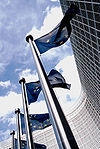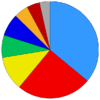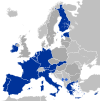- European Anti-fraud Office
-
"OLAF" redirects here. For the given name, see Olaf (disambiguation).
European Union 
This article is part of the series:
Politics and government of
the European UnionPolicies and issuesThe European Anti-fraud Office (commonly known as OLAF, from French: Office de Lutte Anti-Fraude) is charged by the European Union with protecting the financial interests of the European Union: Its tasks are to fight fraud affecting the EU budget, as well as corruption and any other irregular activity, including misconduct, within the European Institutions, in an accountable, transparent and cost-effective manner.
The Anti-fraud Office achieves its mission by conducting, in full independence, internal and external investigations. It also organises close and regular co-operation between the competent authorities of the Member States in order to co-ordinate their activities. OLAF supplies Member States with the necessary support and technical know-how to help them in their anti-fraud activities. It contributes to the design of the anti-fraud strategy of the European Union and takes the necessary initiatives to strengthen the relevant legislation.
It is an administrative investigative body. It has no judicial or disciplinary powers and it cannot oblige national prosecutors to act.
Contents
Structure
OLAF is a General Service Directorate General of the European Commission. For its investigative and operational tasks OLAF works in full independence. In a Special Report of July 2005 the European Court of Auditors concluded that "the hybrid status of the Office, which has investigative autonomy but reports to the Commission for its other duties, has not adversely affected the independence of its investigative function. Being part of the Commission, the Office has been able not only to benefit from substantial administrative and logistical support, but also to take advantage of the anti-fraud legislation that is available to Commission departments".[1]
OLAF has about 500 staff,[2] out of which 160 are investigators. Many of them are lawyers rather than accountants.[2]
The former German public prosecutor Franz-Hermann Brüner was appointed as Director-General for a second five-year term on 14 February 2006 after agreement between the European Commission, Parliament and Council,[3] but died in January 2010. Director Nicholas Ilett is the acting Director General. UKIP MEP and former whistleblower Marta Andreasen publicly expressed interest in the position in April, and reiterated her view that OLAF should be separated from the Commission.[2] The post was assigned to Giovanni Kessler, former Italian anti-fraud chief, in December 2010[4]
History
OLAF was created in 1999, after strong pressure from the European Parliament. Its predecessor UCLAF (Unité de coordination de lutte anti-fraude), an anti-fraud unit dependent of the European Commission, had failed to convince in the fight against irregularities within the European Institutions. The creation of OLAF is one result of the debates about allegations of fraud and the conduct of former European Commissioner Édith Cresson which in the end led to the collective resignation of the Santer Commission.
An evaluation of the work of OLAF can be found in the Special Report[5] of the European Court of Auditors of July 2005.
The European Parliament took stock of the first six years of OLAF during a public hearing[6] in July 2005.
The UK House of Lords, in a report published in November 2006,[7] stated: "On the basis of the evidence we have received we emphatically refute claims that OLAF is too close to the Commission or that the Commission seeks to divert and influence OLAF’s investigative activities". The House of Lords concluded: "We are content with the extent of the investigations which OLAF has undertaken."
Cases
Cigarette companies' smuggling
Based on OLAF investigations and under OLAF's assistance the European Commission and 10 Member States entered into a law suit against three major international cigarette companies before US courts. According to the allegations, the cigarette companies had used smuggling as a channel of distribution. One of the companies later agreed on a settlement which earned the European Union a compensation of around 1 billion Euros.
Eurostat
The most politically delicate OLAF investigations were those into alleged wrongdoings in the EU statistical office EUROSTAT. The case caused serious political problems for the Prodi Commission in 2003. OLAF itself faced the accusation of having started the investigations only after the press reported about the case in 2002 and, especially, in May 2003. On top of that, on 8 July 2008 the European Commission and OLAF were condemned to pay the legal costs plus 56,000 euros to Eurostat's director-general Mr. Franchet and its director Mr. Byk in the judgement[8] of case T-48/05 of the European Court of First Instance.
The Tillack case
OLAF came under pressure in 2004 in the course of an investigation that aimed to identify a leak within its own ranks. In February 2002 the journalist who had first written about the EUROSTAT case, the then Brussels correspondent of the German magazine Stern Hans-Martin Tillack, and subsequently also other journalists had published details from a confidential OLAF document. Quoting that document Tillack revealed that OLAF was in the possession of serious fraud allegations against EUROSTAT. Two years later and based on statements by a former Commission spokesman OLAF claimed that Tillack might have received the internal documents from an official in exchange for money and passed this information to the Belgian public prosecutor. In 2004, following a request from OLAF, a Belgian judge ordered a search of the journalist's home and office in Brussels where the authorities seized his archives and his mobile phone. On the basis of the same information, the German authorities opened also an investigation but decided not to search his German offices. It is unclear why the suggestion was made that a pressing reason for the search would be the journalist's expected move to Washington while in fact he left Belgium for Hamburg. The search was widely condemned as an attempt to violate the principle of protection of journalists' sources.
Following the events Tillack initiated legal proceedings in Germany, Belgium, Strasbourg, and before the European Court of Justice. His complaint before the German courts against the Commission spokesman on whose statements OLAF had based the case was unsuccessful after the spokesman insisted on his immunity as a former Commission official. Tillack's appeals to the Belgian courts were not successful either as the judges did not consider the provisions of article 10 European Convention of Human Rights as pertinent and the Belgian law at the time did not explicitely grant journalists the right to protect their sources. Tillack subsequently took Belgium to the European Court on Human Rights in Strasbourg which may decide to open a case in September this 2006. Supported by the International Federation of Journalists (IFJ) the journalist also took OLAF to the European Court of Justice where all his pleas were dismissed.[9]
On the political level, Tillack complained to the European Ombudsman who wrote a special report[10] in May 2005 in which he recommended that OLAF should acknowledge that it made incorrect and misleading statements in its submissions to him and that the European Parliament could consider adopting his recommendation as a resolution. The European Parliament, however, decided to await the final decision of all Court cases before further treating the Ombudsman's report. However, after the European Court of Human Rights decided on 27 November 2007 in Tillack v. Belgium[11] that Article 10 of the European Convention on Human Rights had been violated, the European Parliament rapporteur responsible for drafting a report was not given the green light to suggest that the Ombudsman's suggestion be taken on board.
An – incomplete – overview of the events is given in the judgement[12] of the European Court of First Instance.
Quotes
- “There are problems with the European anti-fraud office. The reforms of Olaf that were recommended by a committee of experts in 1999 after the fall of the Commission have not been implemented."
-
- Paul van Buitenen, July 2007[13]
See also
References
- ^ Special Report, European Court of Auditors, July 2005
- ^ a b c Whistleblower seeks to head EU anti fraud unit, Accountancy Age, 15 April 2010
- ^ europa.eu
- ^ EU Observer, 14 December 2010
- ^ ECA.europa.eu
- ^ Europarl.europa.eu
- ^ House of Lords, European Union Committee, 50th Report of Session 2005–06, Financial Management and Fraud in the European Union: Perceptions, Facts and Proposals, Volume I: Report, published 13 November 2006
- ^ Eur-lex.europa.eu
- ^ Curia.europa.eu
- ^ Ombudsman.europa.eu
- ^ Cmiskp.echr.coe.int
- ^ Curia.europa.eu
- ^ George Parker: EU's anti-fraud chief facing allegations, Financial Times, 6 July 2007
External links
Administration of the European Commission 
Table of European Commission Directorates-General and Services Civil Service 
Policy DGs Agriculture · Climate Action · Competition · Economic and Financial Affairs · Education and Culture · Employment, Social Affairs and Equal Opportunities · Enterprise and Industry · Environment · Fisheries and Maritime Affairs · Health and Consumers · Home Affairs · Information Society and Media · Internal Market and Services · Joint Research Centre · Justice · Regional Policy · Research · Taxation and Customs Union · Mobility and Transport · EnergyExternal DGs Foreign Policy Instruments Service · Enlargement · Trade · EuropeAid Development and Cooperation · Humanitarian Aid OfficeGeneral Services Communication · Eurostat · OLAF · Publications · Secretariat-General (Secretary-General) · Europe by SatelliteInternal Services Buildings European Union Portal · Brussels Portal Categories:
Wikimedia Foundation. 2010.






